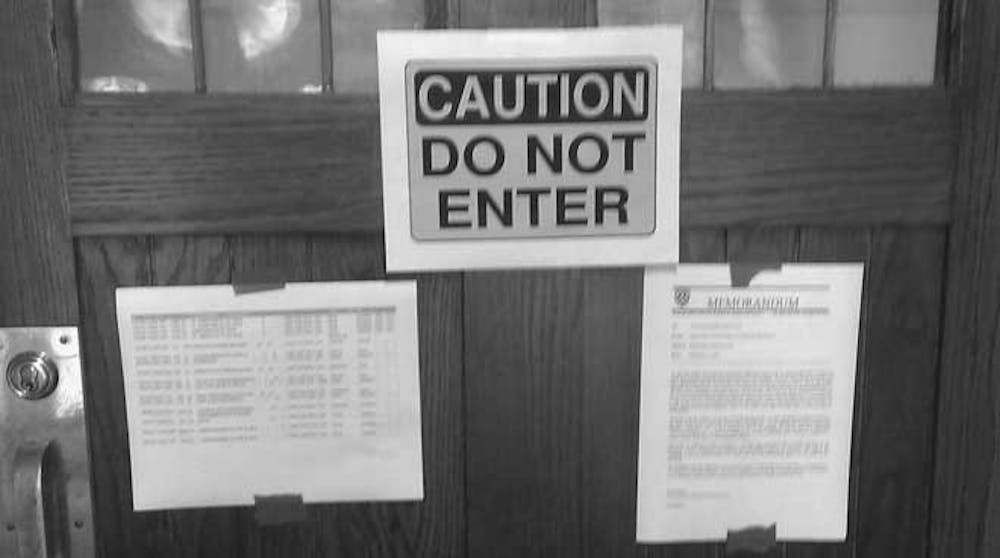One mid-August morning, Mary Claiborne, one of the university custodians, was making her rounds to clean classrooms on the ground floor of Ryland Hall.
When she entered Room 203, she spotted little patches of fur around the room and immediately left because she did not want to aggravate her allergies.
She called professors with offices in the building who in turn reported the problem to University Facilities, where Andrew McBride, the associate vice president for facilities, was able to confirm that the room had been infested with mold.
"During the next weeks, we followed our normal protocol for addressing a mold notification by doing visual assessments, taking moisture readings and testing the air before and after cleaning what we determined was obvious mold," McBride said. "We contracted with Balfor Property Restoration to perform the clean-up in two offices on the third floor and classroom 203, which is temporarily closed, and to clean all of the fan-coil units in the building as a preventative measure."
Professor Hugh West, the history department chair, said that Balfor workers had cleaned his office, where mold had been on some of his books. They had gone through all of his hundreds of books to ensure there would be no residue of mold left, West said. As of the most recent tests, his office and the rest of Ryland was at a safe level, but Room 203 required further cleaning, he said.
"The floor is damp, and you could see little spots of mold with the fur," West said, "so right now, they've actually ripped out the walls and put in new walls and carpet. But one of the issues is trying to figure out the cause and the source. The only thing everyone's sure of is that it was cooler and rained a lot more in the summer than it usually does, and the building didn't cope with that."
West said that the air conditioning setup might have been a factor, too, and that it would ultimately be replaced.
"In the summer, because the air conditioners from original renovations to this building were individual units, one or two were on, not all of them," West said. "So rather than air conditioning for the whole building from the ceiling, where temperature would be even throughout, you've got some on and some off.
"That's an atmosphere conducive to these problems. The vents also aren't made to work around furniture in the room, so sometimes air from those vents get blocked by chairs."
Because of the mold, classes scheduled in Room 203 have been relocated to other rooms or even other buildings, said Suzanne Jones, chair of the English department. Most of the relocated classes are in English, history, interdisciplinary studies or continuing studies, she said.
"Notes or tags were left on the office and classroom doors after Balfor completed the work, which they started Sept. 14 in the classroom and later that week in the offices," Jones said. Professors in the office met with McBride and decided to post a sheet of class relocation details on the door to 203 as well, she said.
History major Ashley McCarty, who also works in the history department as a student liaison, said she had not been aware of the moldy classroom until some of her friends and professors had mentioned it. English major Haisten Bonner said that nobody had systematically informed him, either, although he had noticed the posts on the door of Room 203.
Enjoy what you're reading?
Signup for our newsletter
Jones said that there had been no need to notify all English and history students of a problem contained to one classroom, especially so that no alarm would be raised in the university community for a problem that facilities workers and Balfor personnel had already begun handling swiftly.
Despite Balfor's quick cleaning, work is still on a time- and material-basis, so exact cost totals and reopening time of the classroom are not certain yet, although the goal is to reopen the room within a few weeks, McBride said. The facilities staff ensured that no classroom equipment had been damaged, so the key to the mold incident became finding and stopping the moisture infiltration, particularly because the mold is a common, everyday type that needs such moisture to survive, he said.
Although no illnesses or injuries have been documented, there had been a few continuing studies students who had complained of headaches while in the vicinity of Room 203, West said. In terms of when Ryland would undergo full-scale renovations to avoid future problems like this, McBride and West both said they were not sure, but that it was on the docket. West said that money and handicap-access issues were the only reasons such renovations had not already occurred.
"They used yearly capital to fund small renovations, like the building's new carpets, but they need much more [money] for a bigger project," West said. "For full renovations, there must be handicap-access elevators installed, which will be tricky for this building, because it was built in layers, not straight up. So even with one elevator, there still would be areas of the building disabled people couldn't access."
McBride said that no timetable was set for full-scale renovations to Ryland, and that facilities personnel working there would solely focus on prevention of mold and moisture infiltration until the classroom could reopen.
David Hale, the university's vice president for business and finance, said that he anticipated cleaning and repairing Ryland to cost around $10,000.
Contact reporter Zak Kerr at zachary.kerr@richmond.edu
Support independent student media
You can make a tax-deductible donation by clicking the button below, which takes you to our secure PayPal account. The page is set up to receive contributions in whatever amount you designate. We look forward to using the money we raise to further our mission of providing honest and accurate information to students, faculty, staff, alumni and others in the general public.
Donate Now



